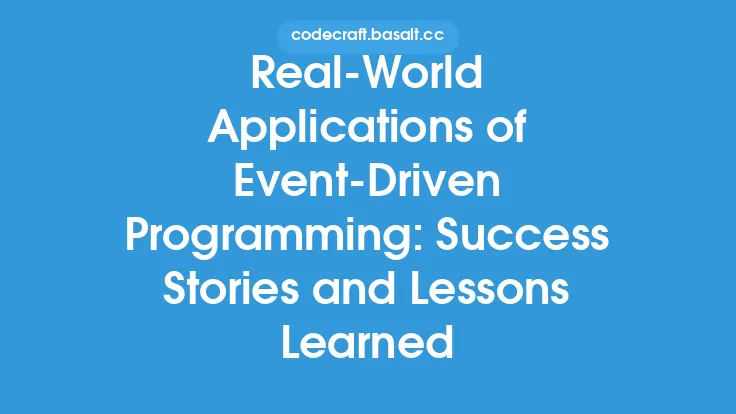The concept of expert systems has been around for decades, and over the years, these systems have been successfully applied in various real-world domains. Expert systems are a type of artificial intelligence that mimics the decision-making abilities of a human expert in a particular field. They are designed to solve complex problems by reasoning and drawing inferences from a knowledge base. In this article, we will explore some success stories and lessons learned from the application of expert systems in real-world scenarios.
History of Expert Systems
The first expert system, called MYCIN, was developed in the 1970s at Stanford University. MYCIN was designed to diagnose and treat bacterial infections, and it was able to perform as well as human experts in this domain. The success of MYCIN led to the development of many other expert systems in various fields, including medicine, finance, and engineering. Today, expert systems are used in a wide range of applications, from medical diagnosis and treatment to financial planning and engineering design.
Applications of Expert Systems
Expert systems have been applied in many different domains, including medicine, finance, engineering, and education. In medicine, expert systems are used to diagnose and treat diseases, as well as to develop personalized treatment plans. For example, the IBM Watson for Oncology system uses natural language processing and machine learning to analyze medical literature and develop personalized cancer treatment plans. In finance, expert systems are used to analyze financial data and make investment recommendations. For example, the BlackRock Aladdin system uses expert systems to analyze financial data and make investment decisions.
Success Stories
There are many success stories of expert systems in real-world applications. For example, the American Express expert system, called Authorizer's Assistant, was developed to help authorize credit card transactions. The system uses a knowledge base of rules and expert knowledge to analyze transactions and determine whether they are legitimate or not. The system has been highly successful, and it has helped to reduce the number of fraudulent transactions. Another example is the General Electric expert system, called PowerPlant, which was developed to help optimize the performance of power plants. The system uses a knowledge base of rules and expert knowledge to analyze data from the power plant and make recommendations for improvement.
Lessons Learned
While expert systems have been highly successful in many real-world applications, there are also some lessons that have been learned from their development and deployment. One of the key lessons is the importance of knowledge acquisition and representation. Expert systems require a large amount of knowledge to be effective, and this knowledge must be acquired and represented in a way that is usable by the system. Another lesson is the importance of testing and validation. Expert systems must be thoroughly tested and validated to ensure that they are working correctly and making accurate decisions. Finally, expert systems must be maintained and updated over time to ensure that they remain effective and accurate.
Technical Challenges
One of the technical challenges of expert systems is the development of the knowledge base. The knowledge base is the heart of the expert system, and it must be developed and maintained over time. There are several techniques that can be used to develop the knowledge base, including knowledge engineering, machine learning, and data mining. Knowledge engineering involves working with human experts to identify and codify their knowledge and expertise. Machine learning involves using algorithms to learn from data and develop models that can be used to make predictions and decisions. Data mining involves using techniques such as decision trees and clustering to identify patterns and relationships in data.
Integration with Other Technologies
Expert systems can be integrated with other technologies, such as machine learning and natural language processing, to create more powerful and effective systems. For example, the IBM Watson system uses a combination of expert systems, machine learning, and natural language processing to analyze medical literature and develop personalized cancer treatment plans. Another example is the Google DeepMind system, which uses a combination of expert systems and machine learning to play complex games such as Go and chess.
Future Directions
The future of expert systems is exciting and promising. With the development of new technologies such as machine learning and natural language processing, expert systems are becoming more powerful and effective. One of the future directions of expert systems is the development of more complex and sophisticated systems that can reason and learn like humans. Another future direction is the integration of expert systems with other technologies, such as the Internet of Things and blockchain, to create more powerful and effective systems.
Real-World Impact
Expert systems have had a significant impact on many real-world domains, including medicine, finance, and engineering. In medicine, expert systems have been used to diagnose and treat diseases, as well as to develop personalized treatment plans. In finance, expert systems have been used to analyze financial data and make investment recommendations. In engineering, expert systems have been used to optimize the performance of complex systems, such as power plants and manufacturing systems. The impact of expert systems will only continue to grow as they become more powerful and effective.
Conclusion
In conclusion, expert systems have been highly successful in many real-world applications, and they have the potential to continue to make a significant impact in the future. By understanding the history, applications, success stories, and lessons learned from expert systems, we can develop more effective and powerful systems that can reason and learn like humans. The integration of expert systems with other technologies, such as machine learning and natural language processing, will only continue to increase their power and effectiveness. As we look to the future, it is clear that expert systems will play an increasingly important role in many real-world domains.





